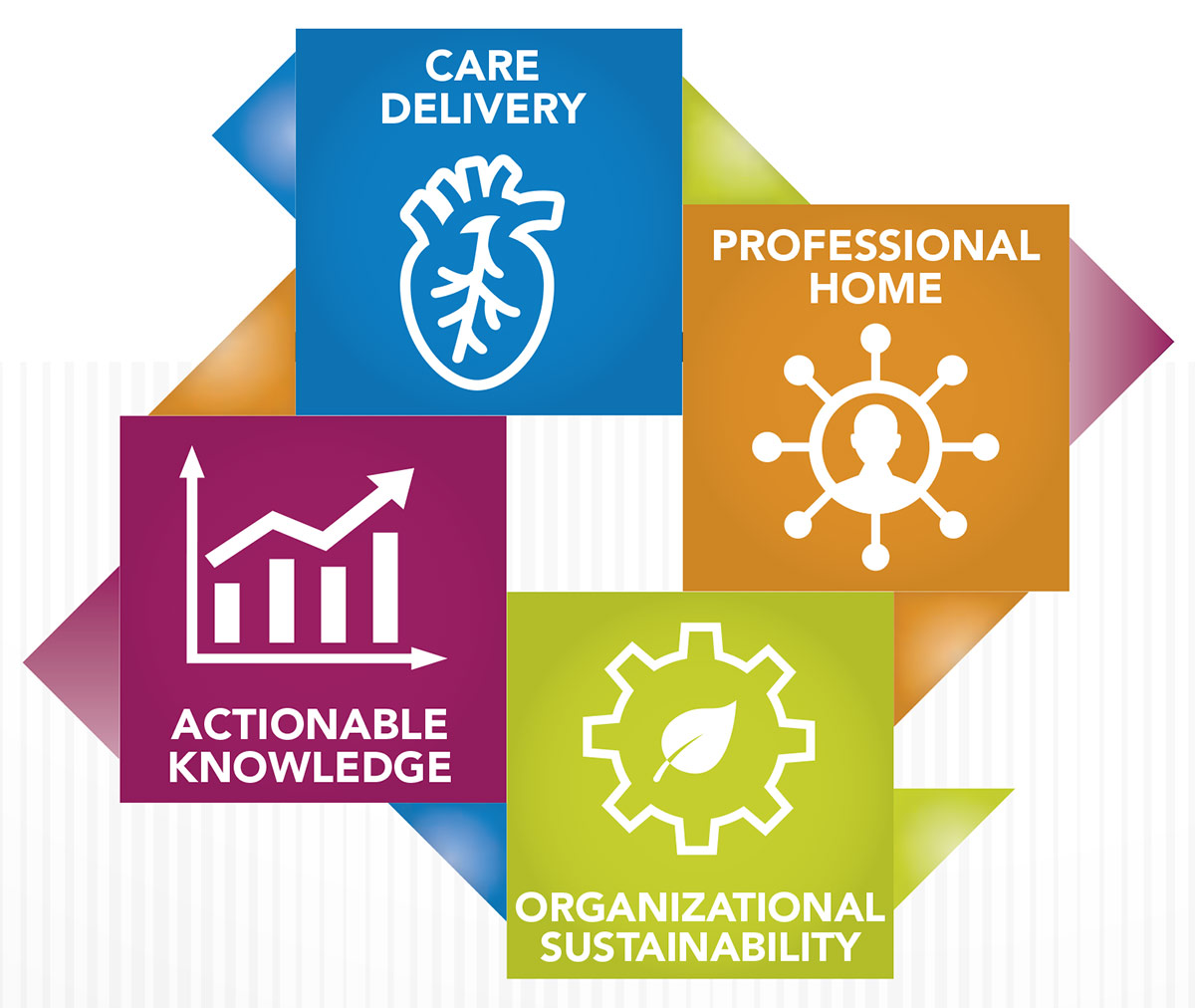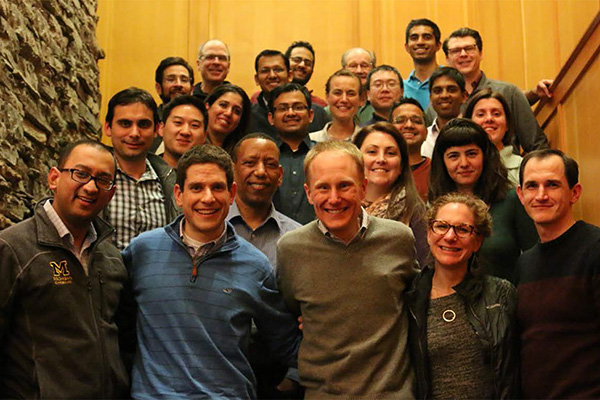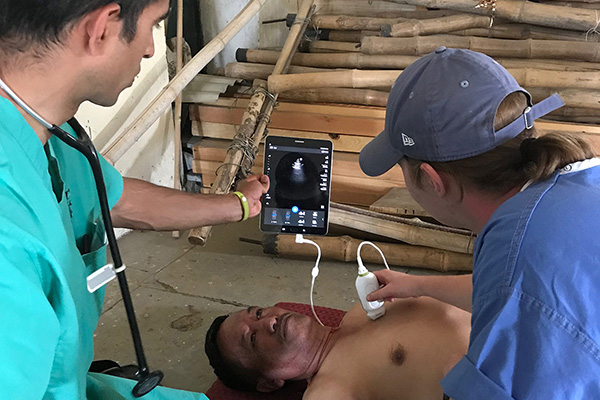Cover Story | ACC Prepares to Embark on Next Strategic Plan
Increasing the ACC’s relevance as the cardiovascular professional home; generating and delivering actionable knowledge; advancing quality, equity and value of cardiovascular care; and ensuring organizational growth and sustainability are the four driving goals of the College’s next Strategic Plan.
The result of countless hours of thoughtful discussions with ACC members, stakeholders, staff, partners and others, these goals weren’t developed overnight. Rather, the 2019-2013 plan is intended to guide the College over the next five years on a path that best meets the growing and changing needs of cardiovascular professionals around the world given new and emerging technologies, latest trends in learning and education, as well as a continuously evolving health care landscape.



“With cardiovascular disease still holding as the #1 cause of mortality worldwide, an aging population, increasing complexity of patients, a changing cardiovascular workforce, and a turbulent health care environment – being a cardiovascular professional today can be challenging,” wrote ACC President C. Michael Valentine, MD, FACC, ACC Vice President Richard J. Kovacs, MD, FACC, and ACC Strategic Plan Board of Trustees Liaison Dipti Itchhaporia, MD, FACC, in a recent leadership page in the Journal of the American College of Cardiology. “We are confident that our next Strategic Plan will place us on a path towards our vision of a world where innovation and knowledge optimize cardiovascular care and outcomes.”
With cardiovascular disease still holding as the #1 cause of mortality worldwide, an aging population, increasing complexity of patients, a changing cardiovascular workforce, and a turbulent health care environment – being a cardiovascular professional today can be challenging.
Among the biggest changes for the College in the last decade is the growth and expansion of its membership base to include cardiovascular professionals from across the care team and from around the world. Ensuring that the ACC is the indispensable resource for all its members, providing both clinical and nonclinical solutions at all stages of their careers, is at the heart of the goal to increase the College’s relevance as the cardiovascular professional home.
Over the course of the next five years, the ACC will be focused on continued efforts to personalize and localize member engagement and learning opportunities. Increasing member diversity and inclusion and working to identify, understand and overcome barriers to entry into the field of cardiology are fundamental to the College being a true home. Additionally, as the trend towards practice and hospital integration continues, engaging with health systems and service lines is becoming even more critical.
Addressing nonclinical competencies like contract negotiations, physician payment models and leadership training are increasingly important in today’s health care environment. Similarly, promoting clinician well-being and finding ways to ease undue administrative burdens to allow clinicians to do what they do best – prevent and treat heart disease – are crucial.

When it comes to generating and delivering actionable knowledge, the ACC is committed to establishing a robust infrastructure that not only better organizes and classifies ACC knowledge and education, but allows it to be more accessible to users based on when, how and where they want it. Leveraging partner platforms and piloting efforts to expand dissemination of information are among the tactics the College will employ in the coming years to improve availability and access. “ACC members are overloaded with information today and we need to innovate how we deliver knowledge to support optimal patient care and learning,” noted Valentine, Kovacs and Itchhaporia in their JACC page.
How do you define and promote all aspects of quality, equity and value of care delivery? That’s the question the ACC will answer between now and 2023. In addition to supporting members and engaging stakeholders in the ongoing transition from a volume to value-based payment environment, the College is also looking at ways to supplement existing NCDR data sets with cost data and patient-reported outcomes in order to measure and improve upon cost, value and equity – key elements of the Quadruple Aim. Developing solution sets that integrate the patient voice is another important factor in achieving this specific strategic goal. Look for decision support protocols and care plans that engage patients in better understanding the impact and influence of care decisions.
Snapshot of the Past Five Years: ACC’s Greatest Accomplishments
In their JACC Leadership page, Valentine, Kovacs and Itchapporia highlight these greatest accomplishments, among others, by the ACC guided by the current Strategic Plan.
According to Valentine, Kovacs and Itchhaporia, “the College has a nearly 70-year history of finding ways to advance quality, equity, and value of cardiovascular care. Continuing to lead in defining standards and providing tools in this area is vital to the College’s success.”
The ability of ACC to deliver on its Mission, Vision and all of its Strategic Goals is dependent on organizational growth and sustainability. Inherent in the Strategic Plan are strategies for enhanced revenue diversity and investment, as well as building a strong pipeline of leaders from diverse backgrounds, cultures and stages of their careers. Developing innovative projects to drive the Mission of the ACC, increasing organizational efficiency and expanding upon existing leadership development offerings are among the strategies the College will implement going forward.
While much has changed in the world – and the cardiovascular profession itself – since then, this underlying objective remains the same. We are confident that our next Strategic Plan will place us on a path towards our vision of a world where innovation and knowledge optimize cardiovascular care and outcomes.
“The ACC was founded nearly seven decades ago during a time of great change, with the primary objective of ensuring cardiovascular professionals a place to learn, grow and share,” said Valentine, Kovacs and Itchhaporia in JACC. “While much has changed in the world – and the cardiovascular profession itself – since then, this underlying objective remains the same. We are confident that our next Strategic Plan will place us on a path towards our Vision of a world where innovation and knowledge optimize cardiovascular care and outcomes.”

Keywords: ACC Publications, Cardiology Magazine, Trustees, Leadership, Cardiovascular Diseases
< Back to Listings








